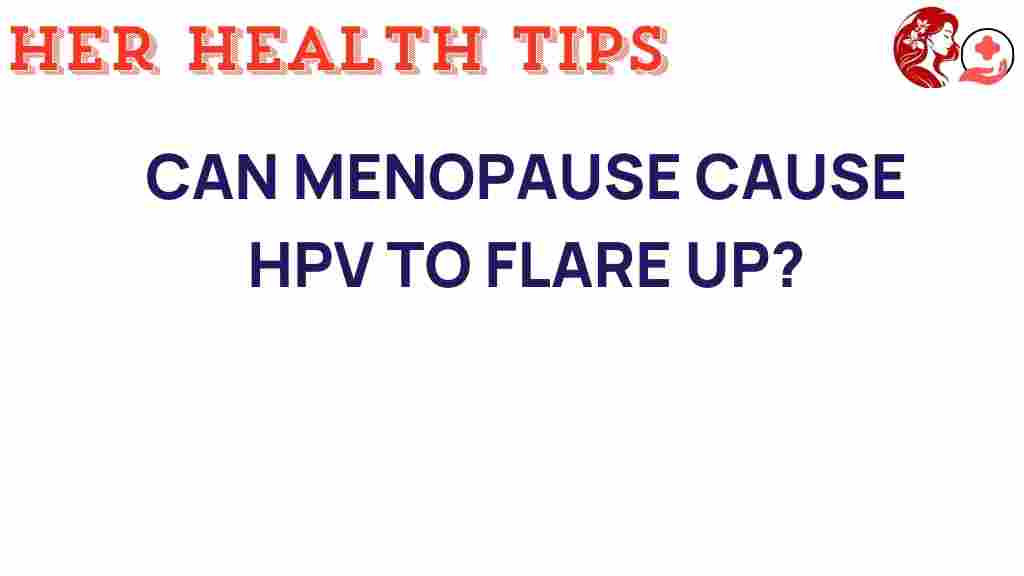Unraveling the Link: Can Menopause Trigger HPV Resurgence?
As women transition through various stages of life, menopause is a significant milestone that brings about numerous physiological changes. One of the lesser-discussed topics surrounding menopause is its potential impact on women’s health, particularly regarding the resurgence of human papillomavirus (HPV) infections. In this article, we delve into how menopause may influence HPV, exploring the symptoms, hormonal changes, and the implications for sexual health and immunity.
The Connection Between Menopause and HPV
Menopause marks the end of a woman’s reproductive years, typically occurring between the ages of 45 and 55. During this time, hormonal changes—particularly a decrease in estrogen—can affect various aspects of health, including the immune system. Understanding this connection is vital for women’s health, especially regarding viral infections like HPV.
HPV is the most common sexually transmitted infection (STI) globally, with certain strains linked to cervical cancer and other health issues. While many women clear the virus naturally, the risk of reactivation or persistence may increase during menopause due to altered immunity and other factors.
How Hormonal Changes Affect Immunity
During menopause, the body undergoes significant hormonal fluctuations, primarily a decline in estrogen levels. This hormonal shift can have several effects on the body, including:
- Reduced Immune Response: Estrogen plays a role in modulating the immune system. Lower levels can diminish the body’s ability to fight off infections, including viral infections like HPV.
- Changes in Vaginal Health: Decreased estrogen can lead to vaginal atrophy, which may affect sexual health and increase susceptibility to infections.
- Inflammatory Responses: Hormonal changes can lead to increased inflammation, which may influence the behavior of viral infections.
Symptoms of Menopause and Their Impact on HPV
Women experiencing menopause often report a range of symptoms, which can include:
- Hot flashes
- Night sweats
- Vaginal dryness
- Mood changes
- Sleep disturbances
The symptoms of menopause, particularly vaginal dryness and atrophy, can create an environment that may facilitate HPV persistence or resurgence. Women may experience discomfort during sexual intercourse, leading to decreased sexual activity or changes in their sexual health practices.
Understanding HPV and Its Risks
HPV is a group of more than 200 related viruses, with over 40 types transmitted through direct skin-to-skin contact, primarily through sexual activity. While many HPV infections are asymptomatic and resolve on their own, some can lead to serious health complications, including:
- Cervical cancer
- Other genital cancers (vulvar, vaginal, anal)
- Throat and mouth cancers
- Genital warts
For women approaching or experiencing menopause, understanding the potential for HPV resurgence is crucial, given the changes in immunity and vaginal health. It’s essential to be proactive about prevention and maintaining sexual health.
Prevention Strategies During Menopause
Despite the challenges posed by menopause, there are several strategies women can adopt to prevent HPV resurgence and maintain overall health:
- Regular Screenings: Routine Pap smears and HPV tests can help detect any issues early. Consult your healthcare provider about the appropriate screening schedule for your age and health history.
- HPV Vaccination: The HPV vaccine is effective in preventing the types of HPV that cause most cervical cancers and genital warts. Speak with your healthcare provider about vaccination options, even during menopause.
- Maintain a Healthy Lifestyle: A balanced diet, regular exercise, and adequate sleep can bolster immunity and overall well-being.
- Practice Safe Sex: Using condoms can reduce the risk of HPV transmission and other STIs. It’s essential to discuss sexual health openly with partners.
- Manage Symptoms: Seek treatment for menopausal symptoms, especially vaginal dryness, to improve sexual health and comfort. Options may include lubricants, moisturizers, or hormone replacement therapy (HRT).
Troubleshooting Tips for Managing Menopausal Symptoms
Managing the symptoms of menopause can be challenging, especially when considering their impact on sexual health and immunity. Here are some troubleshooting tips:
- Vaginal Dryness: Over-the-counter vaginal moisturizers or lubricants can provide relief during intercourse. If symptoms persist, consult your healthcare provider for prescription options.
- Hot Flashes: Lifestyle changes, such as wearing breathable clothing, keeping cool at night, and avoiding triggers (like spicy foods or caffeine), can help manage hot flashes.
- Mood Changes: Consider mindfulness practices, such as yoga or meditation, to help manage stress and mood swings. Counseling or therapy can also be beneficial.
- Sleep Disturbances: Create a calming bedtime routine and maintain a consistent sleep schedule. Avoid screens before bed to improve sleep quality.
Conclusion
In conclusion, the relationship between menopause and the resurgence of HPV is an important topic in women’s health. The hormonal changes accompanying menopause can influence immunity and vaginal health, potentially affecting the persistence of HPV. Understanding the symptoms of menopause and adopting preventive strategies can help women maintain their sexual health and overall well-being.
Women are encouraged to stay informed about their health, engage in regular screenings, and consult healthcare providers regarding any concerns about HPV, menopause, and sexual health. Emphasizing prevention, managing symptoms, and fostering open conversations about sexual health are vital steps in navigating this transitional phase of life.
For more information on HPV and women’s health, you can visit this resource. To learn more about managing menopause symptoms, check out this comprehensive guide.
This article is in the category Reproductive and created by HerHealthTips Team
